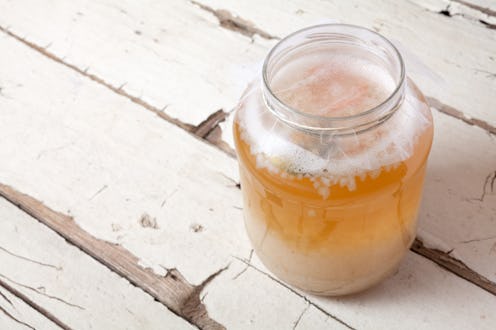(Living)
Better Than Kombucha? What To Know About Other Buzzy Probiotic Drinks

It's gone way beyond kombucha: It seems probiotic drinks and their reported benefits are more talked about than ever, from fermented veggie shots to fiber-filled, "healthy" soft drinks. But do they work or are these products just trying to cash in on one of the biggest wellness trends? Well, a little bit of both. If you ask nutritional experts, there are a few things you probably want to know before you substitute these from your daily supplement.
Read more: How To Make Apple Cider Vinegar Taste Good If You Hate The Flavor But Want The Benefits
As a quick refresher, a probiotic is a live microorganism which has been widely recognized as a way to maintain gut health (which may also be tied to your mental health). And there are a bunch of different ways to get your regular dose, from whole foods to capsule forms. There are advantages to each of these methods, experts say. For example, eating your probiotics (in yogurt or kimchi, for example) is beneficial because it also means the addition of certain nutrients you get from food.
However, a supplement can come in handy if you can't get your hands on nutritious food (while traveling perhaps) or have certain health issues. "For most people, it's best to get probiotics from food, such as kraut juice or kombucha. However, for those with sensitivities to sugar or caffeine, or with severe bacterial dysbiosis, a pill might be a better option," says Cailtin Self, nutritionist for Frugal Nutrition.
So where do drinks fall into this discussion? Ideally, drinks would be a form of whole food — but some manufactured products could add in ingredients you want to steer clear of or consume in moderation. "Remember, terms like 'healthy' or 'clean' are not regulated by the FDA and their products can still have boatloads of sugar, unnecessary additives and artificial colors," says Tracy Lockwood Beckerman, registered dietitian and author of The Better Period Food Solution. "So be sure to always scan over the nutrition label and if the ingredient list looks too long or the sugars are too high for your dietary or health goals, keep on walking."
But that also doesn't mean avoiding these buzzy new drinks — like low-sugar soda alternatives or apple cider vinegar spiked concoctions — altogether. Beckerman explains that many of these are still better for you than a lot of other artificial, over-sweetened drinks on the market. "I’m into this new rotation of 'better-for-you' bevvies because they are moving us farther away from calorically dense and sugar laden beverages and closer to functional and nutritionally superior choices. While these beverages shouldn’t replace your vitamins or supplements just yet, it may not necessarily hurt if you are looking for additional and natural ways to boost your system."
Want to take a break from your usual kombucha a try another type of probiotic drink? Self suggests giving water kefir a try instead. "Water kefir is a great option for those with sensitivities to caffeine or dairy," she says. "Selective eaters have a hard time with other gut supportive foods like kraut, so water kefir is a palatable option. While I never want to desensitize someone's palate to sugar (which stevia can do), this is one case where I might recommend stevia-sweetened beverages. Water kefir with stevia is great for sensitive guts!"
And if you want to try some of the other options out on the market, just be sure to carefully inspect the label for unnecessary ingredients, start with a small amount, and pay attention to how your body responds. Ahead, find a few drinks to look into that are both tasty and could help give you a happier gut.
We only include products that have been independently selected by The Zoe Report's editorial team. However, we may receive a portion of sales if you purchase a product through a link in this article.